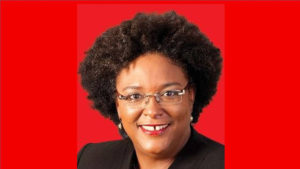 One week after her Barbados Labour Party’s (BLP) historic victory at the polls and getting to work on the economic reality in Barbados — meeting with social partners, trade unions and the business community — Mia Mottley telephoned managing director of the International Monetary Fund (IMF) Christine Lagarde.
One week after her Barbados Labour Party’s (BLP) historic victory at the polls and getting to work on the economic reality in Barbados — meeting with social partners, trade unions and the business community — Mia Mottley telephoned managing director of the International Monetary Fund (IMF) Christine Lagarde.
The new prime minister and minister of economic affairs and investment, for the most part, seemed to have a genuine approach, relying on the perspective:
“A major economic restructuring was now necessary in the face of an out-of-control debt of 175 per cent of gross domestic product, an estimated $15 billion, which is said to be $9 billion more than what the previous Democratic Labour Party (DLP) Administration inherited in 2008 when it took office.”
According to Mottley: “I briefed her on the present state of the public finances, the current debt and reserve positions, and assured her that we are committed to taking decisive action to rebuild Barbados.
“My Government and all parts of the social partnership agree that there is no avoidance in the delay in treating the economic and financial irresponsibility of the recent past. Our national reconstruction starts today. We set course, not on the easy or quick path but the right path. We will protect the most vulnerable, but we will all have to make sacrifices for our country.”
In a statement the IMF managing director said: “As announced by Prime Minister Mottley earlier today, the Barbados economy has been going through significant challenges for some years. The authorities are developing an economic reform plan designed to address these challenges, and they have asked the international community and the IMF to assist them as they put the economy back on a path to recovery. An IMF team led by Bert van Selm will be visiting Bridgetown to start discussions on how the fund can support the authorities’ economic plan. Our ultimate goal is to help Barbados achieve higher living standards and more inclusive growth for the years ahead.”
This is of particular interest considering that Barbados was in a similar situation in the 1990s. The Erskine Sandiford-led Administration used a stabilisation and adjustment programme. The results were job losses and eight per cent wage cuts for public servants and the demise of the DLP Administration.
Moreover, just how Prime Minister Mottley will deliver the party’s manifesto promises to provide economic opportunity for all Barbadians remains a measure that is essential to fight unemployment and poverty.
Policies pursued over the past years seem designed to remove basic protections from the poor and the unemployed, and have been “neglectful at best”.
The party manifesto touted raising the contributory and non-contributory pensions, including the invalidity and survivor’s benefits; eliminating tuition fee payments for Barbadians attending the University of the West Indies; removing the National Social Responsibility Levy; providing trust loans for Barbadians; and eliminating pit toilets.
In short, providing solid social protection and addressing underlying problems to increase equality will require economic growth and emphasis on external factors.
“Today we move forward together in a new spirit of openness and with a new covenant of hope and opportunity. I ask our domestic and external creditors to accompany us on this journey of rescue, rebuilding and transformation,” Prime Minister Mottley said.
This is an eloquent and worrisome reminder to individual regional leaders whose singular incompetence, as in St Lucia today, ignores historic insights and inevitably makes lots of dumb mistakes.
The facts are “the fiscal position weakened in FY2017/18, underscoring the need for corrective policies”.
The Athenians capture this impeccably: “The strong do what they can, and the weak suffer what they must.”
